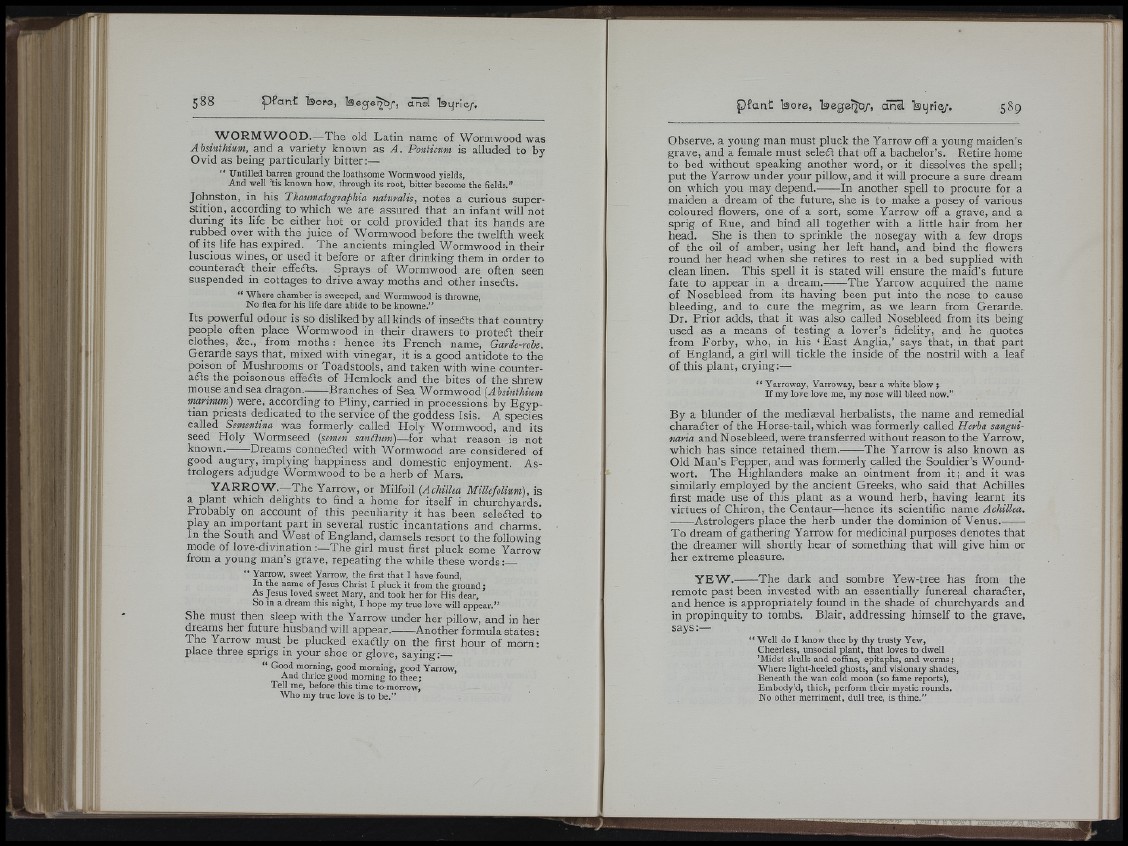
îi
il
i î f
fi (t
fe l : ;
fe.: inr
.u
W O RM W O O D .—The old Latin name of Wormwood was
Absinthium, and a variety known as A. Ponticum is alluded to by
Ovid as being particularly bitter:—
“ Untilled barren ground the loathsome Wormwood yields,
And well ’tis known how, through its root, bitter become the fields.”
Johnston, in his Thaumatographia natuvalis, notes a curious superstition,
according to which we are assured that an infant will not
during its life be either hot or cold provided that its hands are
rubbed over with the juice of Wormwood before the twelfth week
of its life has expired. The ancients mingled W^ormwood in their
luscious wines, or used it before or after drinking them in order to
counteraa their effeas. Sprays of Wormwood are often seen
suspended in cottages to drive away moths and other in se ts.
“ Where chamber is sweeped, and Wormwood is throwne,
No flea for his life dare abide to be knowne.”
Its powerful odour is so disliked by all kinds of in se ts that country
people often place Wormwood in their drawers to protea their
clothes, &c., from moths: hence its French name, Garde-robe.
Gerarde says that, mixed with vinegar, it is a good antidote to the
poison of Mushrooms or Toadstools, and taken with wine counter-
a a s the poisonous effeas of Hemlock and the bites of the shrew
mouse and sea dragon. Branches of Sea Wormwood {Absinthium
marinum) were, according to Pliny, carried in processions by E g yp tian
priests dedicated to the service of the goddess Isis. A species
called Sementina was formerly called Holy Wormwood, and its
seed Holy Wormseed {semen sandum)—for what reason is not
known. Dreams conneaed with Wormwood are considered of
good augury, implying happiness and domestic enjoyment. Astrologers
adjudge Wormwood to be a herb of Mars.
Y A R R O W .—The Yarrow, or Milfoil {Achillea Millefolium), is
a plant which delights to find a home for itself in churchyards.
Probably on account of this peculiarity it has been seleaed to
play an important part in several rustic incantations and charms.
In the South and West of England, damsels resort to the following
mode of love-divination :—The girl must first pluck some Yarrow
from a young man’s grave, repeating the while these words:—
“ Yarrow, sweet Yarrow, the first that I have found,
In the name of Jesus Christ I pluck it from the ground j
As Jesus loved sweet Mary, and took her for His dear,
So in a dream this night, I hope my time love will appear.”
She must then sleep with the Yarrow under her pillow, and in her
Æeams her future husband will appear. Another formula states :
The Yarrow must be plucked exadtly on the first hour of morn:
place three sprigs in your shoe or glove, saying:—
“ Good morning, good morning, good Yarrow,
And thrice good morning to thee;
Tell me, before this time to-morrow.
Who my true love is to be.”
Observe, a young man must pluck the Yarrow off a young maiden’s
grave, and a female must selecft that off a bachelor’s. Retire home
to bed without speaking another word, or it dissolves the spell;
put the Yarrow under your pillow, and it will procure a sure dream
on which you may depend. In another spell to procure for a
maiden a dream of the future, she is to make a posey of various
coloured flowers, one of a sort, some Yarrow off a grave, and a
sprig of Rue, and bind all together with a little hair from her
heaL She is then to sprinkle the nosegay with a few drops
of the oil of amber, using her left hand, and bind the flowers
round her head when she retires to rest in a bed supplied with
clean linen. This spell it is stated will ensure the maid’s future
fate to appear in a dream. The Yarrow acquired the name
of Nosebleed from its having been put into the nose to cause
bleeding, and to cure the megrim, as we learn from Gerarde.
Dr. Prior adds, that it was also called Nosebleed from its being
used as a means of testing a lover’s fidelity, and he quotes
from Forby, who, in his ‘ East Anglia,’ says that, in that part
of England, a girl will tickle the inside of the nostril with a leaf
of this plant, crying:—
“ Yarroway, Yarroway, bear a white blow
I f my love love me, my nose will bleed now.”
B y a blunder of the mediæval herbalists, the name and remedial
characfler of the Horse-tail, which was formerly called Herba sangui-
naria and Nosebleed, were transferred without reason to the Yarrow,
which has since retained them. The Yarrow is also known as
Old Man’s Pepper, and was formerly called the Souldier’s Woundwort.
The Highlanders make an ointment from it; and it was
similarly employed by the ancient Greeks, who said that Achilles
first made use of this plant as a wound herb, having learnt its
virtues of Chiron, the Centaur—hence its scientific name Achillea.
Astrologers place the herb under the dominion of Venus.------
To dream of gathering Y arrow for medicinal purposes denotes that
the dreamer will shortly hear of something that will give him or
her extreme pleasure.
Y E W . The dark and sombre Yew-tree has from the
remote past been invested with an essentially funereal charaiiler,
and hence is appropriately found in the shade of churchyards and
in propinquity to tombs. Blair, addressing himself to the grave,
says :—
“ Well do I know thee by thy trusty Yew,
Cheerless, unsocial plant, that loves to dwell
’Midst skulls and coffins, epitaphs, and worms ;
Where light-heeled ghosts, and visionary shades,
Beneath the wan cold moon (so fame reports),
Embody’d, thick, perform their mystic rounds.
No other merriment, dull tree, is thine.”
...